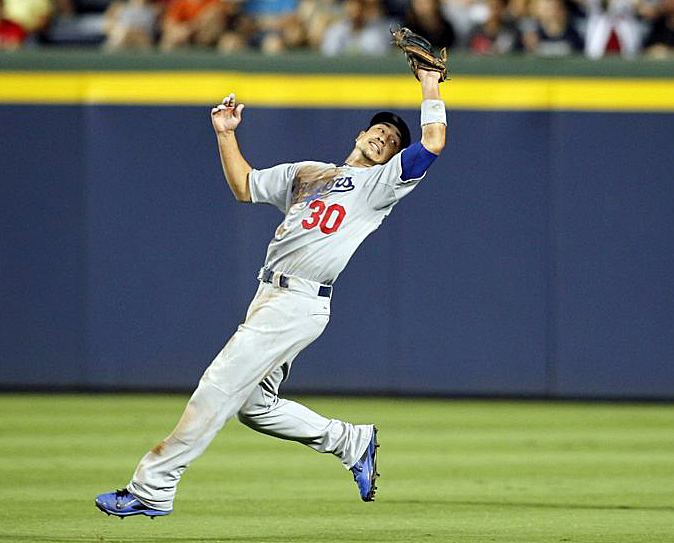In the big scheme of things a one-year / three to four million dollar MLB contract for a 28-year-old Gold Glove second baseman is a steal – especially when you consider that the Dodgers have a half dozen guys on their roster making north of $20 million per year.
Hold that thought for a minute.
On July 28, 2014 the Dodgers acquired 2012 Gold Glove second baseman Darwin Barney from the Chicago Cubs, who designated the soon-to-be 29-year-old Portland, Oregon native for assignment only days earlier. Barney had signed a one-year / $2.3 million contract with the Cubs on February 6, 2014 avoiding arbitration, however he did not fit into Cubs President of Baseball Operations Theo Epstein’s long-term plans for the organization – this in spite of Barney’s outstanding defensive skills.
“When the Cubs told me what was going to happen they told me there was a reason,” said Barney shortly after arriving in Los Angeles. “It wasn’t that I wasn’t good enough, it was more that they needed to move these guys along and they thought a designation [for assignment] would make a trade happen a lot sooner, and they thought that would be better for me and where I would end up along the timeline.”
It did exactly that. It also allowed Epstein to call up 21-year-old top second base prospect Javier Baez. Baez would go on to appear in 52 games with the Cubs hitting a paltry .169 / .227 / .324 for a .551 OPS. He did, however, hit nine home runs and stole five bases while being caught only once in his short time with the Cubs and appears to be a significant offensive upgrade over Barney.

Although Darwin Barney showed Dodger fans why he is a former Gold Glove winner, he also showed his ability to get on base – something that the Dodgers desperately need in front AGon, Kemp, Crawford and Puig. (Photo credit – Brett Davis)
In exchange for Barney the Dodgers gave the Cubs 20-year-old Low-A right-handed pitching prospect Jonathan Martinez, who was 7-5 with a 3.47 ERA with the Great Lakes Loons and ended up going 4-0 with a 2.21 ERA with the Cubs Low-A Kane County Cougars. Although it remains to be seen whether or not Martinez can maintain this level of success at higher minor league levels, it’s safe to say that both the Dodgers and Cubs are happy with the deal.
“Obviously [being designated for assignment] was hard,” said Barney. “But being able to be part of this organization is exciting. Obviously there’s a lot of fun guys here, a lot of different personalities and it’s refreshing to be in an atmosphere that’s all about winning, so it’s been a lot of fun.”
Barney appeared in 22 games for the Dodgers hitting .303 / .467 / .424 for a .891 OPS. He hit one home run and collected seven RBIs in his short time with the team. He also drew eight walks and was hit three times in his 45 plate appearances, hence his very impressive .467 on-base percentage. However, in spite of these numbers Dodgers manager Don Mattingly did not include Barney on the NLDS playoff roster – much to the surprise of many.
“Dee’s our second baseman,” said Mattingly during an August 15 interview. “He’s hit left-handers, he’s hitting close to .300 with lefties and doing a good job with those guys. That being said, we’ll make sure we keep Dee rested. I think we did a pretty good job so far, he’s been healthy, try to keep him rested. … But Darwin will get some at bats, he’ll probably see some time at short and we’ll see how that goes. So we don’t really have a true plan of saying that every time we see a lefty comes up that he’s going to play and Dee’s not.”
Unfortunately, Gordon went a pathetic 3 for 17 (.176) in the Division Series with six strikeouts. He left runners in scoring position with two outs six times during the series and looked completely lost at the plate. As for Gordon’s lightning speed, he stole exact one base in the DS; but as they say: “You can’t steal first base.” Would Barney have done any better? That’s something that we’ll never know, but it’s hard to believe he would have done any worse.
As for seeing some time at short, Barney appeared in exactly two games there – two innings as a defensive replacement and one full nine-inning game in which he started at the position. Although he committed one error in his short time with the Dodgers (at second base), he made several incredible defensive plays – especially during the final week of the regular season.
Now back to that original thought.
Because Barney is arbitration-eligible and will not become a free agent until 2017, the Dodgers would be foolish not to tender him a contract for 2015 – something in the aforementioned one-year / three to four million dollar range. Barney has proven that he can hit off the bench, has a propensity for getting on base and is unquestionably a great defender. And even though Barney did not steal a base in his short time with the Dodgers, he showed excellent speed on the base paths. And while Barney may be a long shot to displace Gordon as the Dodgers everyday second baseman in 2015, a strong spring training could do exactly that.
Tendering Darwin Barney a contract is definitely a low risk / (potentially) high reward proposition and should be a no-brainer for the Dodgers.
Pay the man, Andrew.




 November 3rd, 2014 at 6:00 am
November 3rd, 2014 at 6:00 am  by Ron Cervenka
by Ron Cervenka  Posted in
Posted in 
